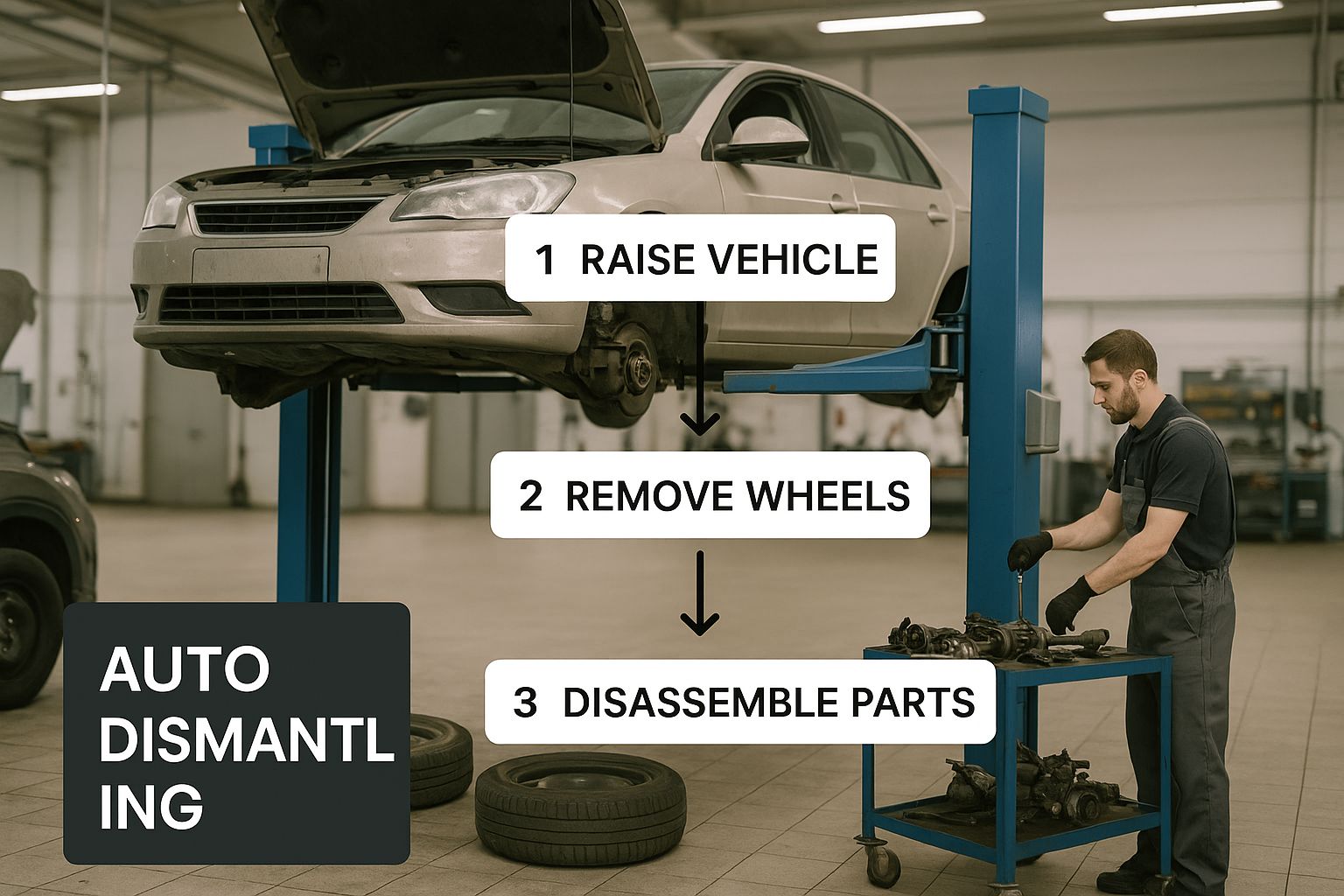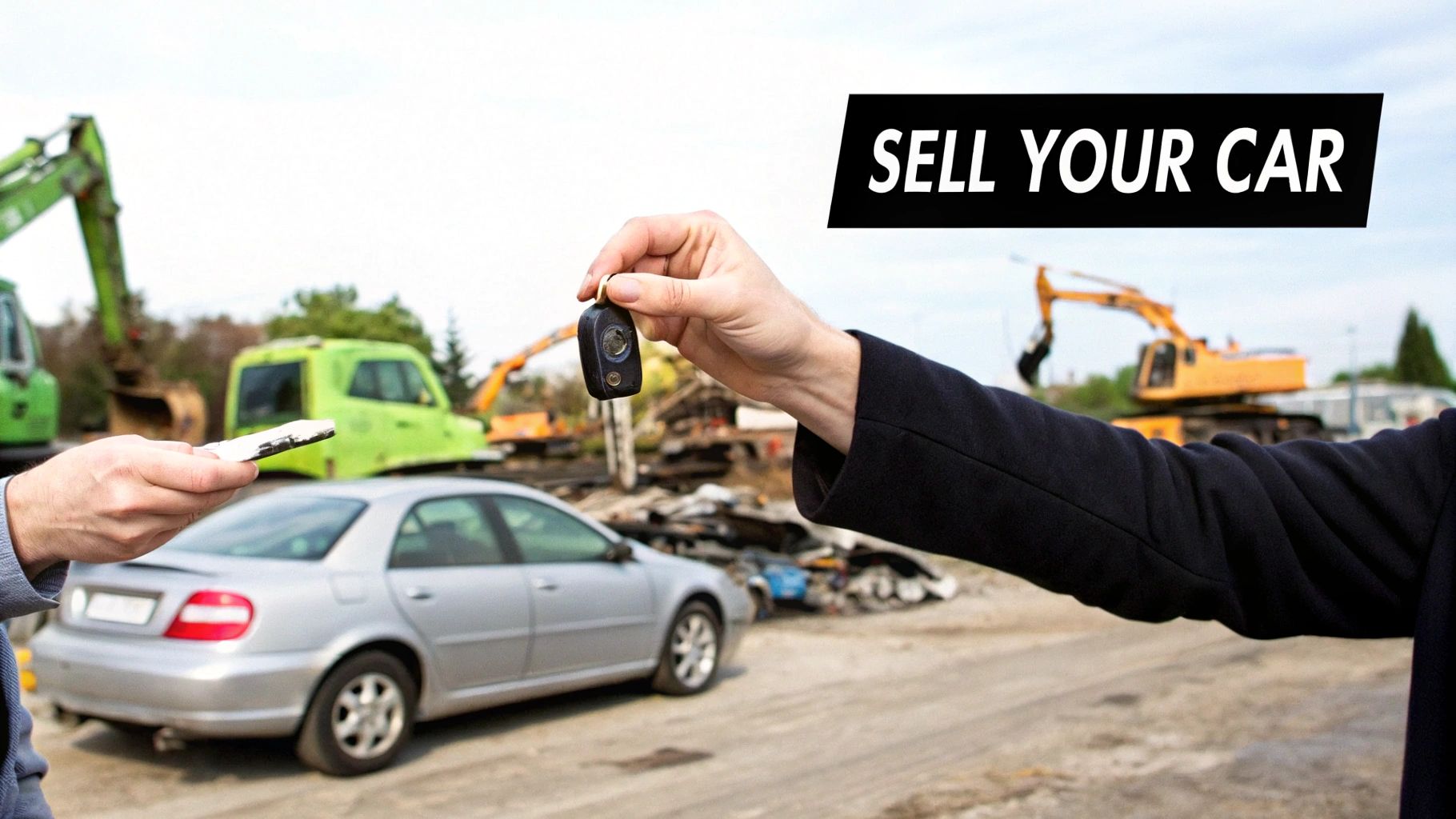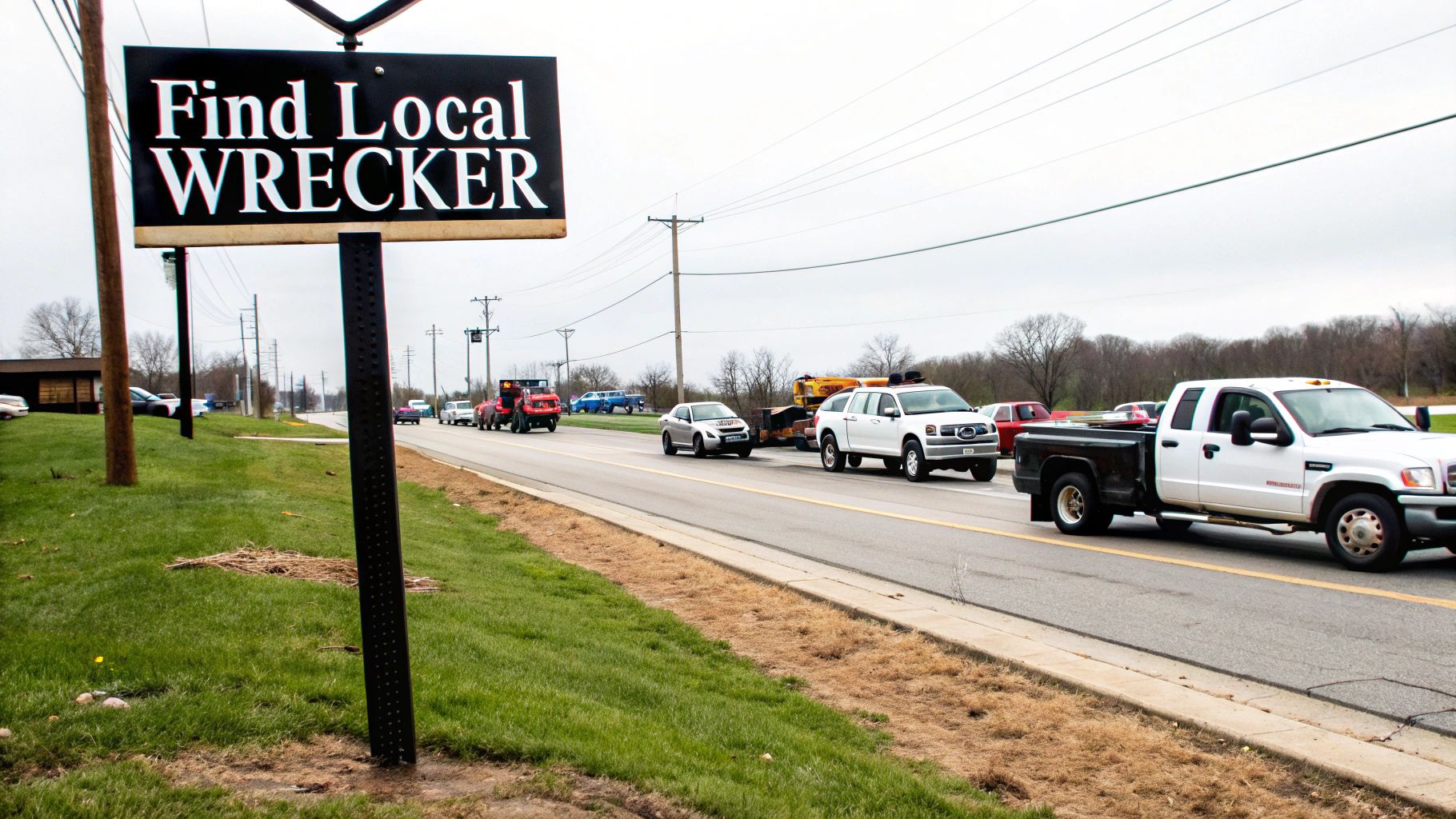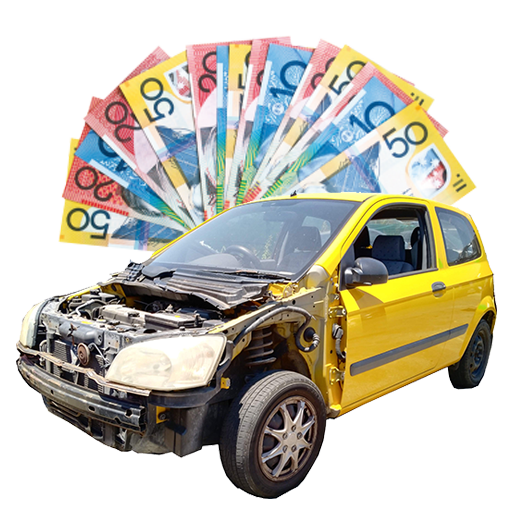That old car in your driveway doesn't have to be a headache. In fact, that quick search for "auto wreckers near me" is the first step toward turning that unwanted vehicle into a nice pile of cash, often with free towing thrown in.
This guide will walk you through everything, from getting a fair price to handing over the keys.
Finding the Best Local Auto Wreckers and Getting Top Dollar
Let's face it, having an old, broken-down, or unregistered car just sitting there is a pain. It's an eyesore hogging up space, and every day it sits, it's worth less and less. This is where auto wreckers come in, offering a smart solution to your automotive problem.
Forget the endless hassles of a private sale—the tyre-kickers, the lowball offers, and the mountain of paperwork. A good, reputable wrecker makes the whole thing incredibly simple. They are the backbone of the automotive recycling industry, making sure old cars are dealt with responsibly.
Why Do Wreckers Even Want My Old Car?
It’s a common mistake to think wreckers just want your car for its scrap metal value. The truth is, your vehicle is a treasure trove of different resources. A professional auto wrecker doesn't just see a junker; they see a collection of parts and materials, and they'll assess its value based on a few key things:
- Salvageable Parts: That engine, transmission, alternator, or even a straight body panel can be pulled, cleaned up, and sold as an affordable replacement part for someone else's car.
- Scrap Metal: Of course, the car's metal frame itself has value. It's weighed and sold to be melted down and recycled into new steel products.
- Hard-to-Find Components: If you've got an older or less common model, some of its parts might be in high demand, which can really bump up the price you're offered.
This whole process fuels a thriving circular economy. The Australian automotive aftermarket, which relies on these parts suppliers, is projected to swell to USD 18.27 billion by 2032. As our nation's cars get older, the demand for good, recycled parts only goes up. You can dive deeper into the automotive aftermarket forecast on CoherentMI.com.
When you sell your car to a wrecker, you're doing more than just getting cash. You're plugging into a sustainable system that keeps affordable parts in circulation for other drivers and dramatically cuts down on industrial waste. It’s a win for your bank account and for the environment.
How to Vet and Compare Local Auto Wreckers
A quick search for "auto wreckers near me" will flood you with options. But here's the reality: not all of them are playing the same game. To make sure you get the best cash offer and dodge the dodgy operators, a little bit of homework is well worth the effort.
First up, look at their digital footprint. Don't just glance at the star rating on their reviews. You need to dig into the actual comments. What are people really saying? Look for patterns. Are there repeated complaints about tow truck drivers showing up late or quotes suddenly dropping when they arrive? Consistent, positive feedback about professionalism and fair pricing is what you’re looking for. That’s a massive green flag.
This is the kind of methodical work a quality wrecker performs. They aren't just crushing cars; they're salvaging valuable components.

As the image shows, their profit comes from carefully reclaiming parts, which is why they can offer you decent cash for your vehicle.
Dig Deeper Than a Google Search
Once you have a shortlist of a few promising businesses, it's time to visit their websites. A professional, legitimate wrecker will have a site that clearly lists their physical address and contact details. Look for an ABN (Australian Business Number) and any information about their licences or environmental policies. It shows they're a serious operation.
A critical tip from personal experience: be extremely cautious of social media pages or classified listings that ask you to pay for anything upfront. ScamNet in WA has issued warnings about fake pages impersonating real auto wreckers. Always, always verify a business through their official website or phone number before you agree to anything.
Now for the most powerful tool you have: your phone.
Pick up the phone and call at least three different local wreckers. This isn't just about getting a price; it's a chance to feel out their customer service and get straight answers to some important questions.
Key Questions to Ask Every Wrecker:
- Is the quote you’re giving me now guaranteed, or could it change when you see the car?
- Does your offer include free towing, or will there be other charges?
- How do you pay (cash on the spot, bank transfer), and when exactly will I get the money?
- What specific paperwork do I need to have ready to sell the car to you?
By asking each company the exact same questions, you create a simple, direct way to compare them. This process takes the guesswork out and helps you pinpoint the most reliable and profitable auto wreckers near me, ensuring you get the best deal for your old car.
Getting Your Car Ready for a Smooth Handover
So, you've picked a local wrecker and settled on a fair price. Excellent. Now, a little bit of prep work goes a long way to make sure the final handover is dead simple and professional. Trust me, spending 30 minutes on this now can save you a massive headache when the tow truck driver is standing on your curb.
Clear Out Your Personal Stuff
First things first, give your car a final, thorough clean-out. You would not believe the things people leave behind. I'm talking about more than just old receipts and empty coffee cups. Check under the seats, in the glove box, the centre console, and especially the boot. Look for important documents, old photos, kids' toys, or even that emergency $20 note you stashed away.
Once that car is hooked up and towed away, those forgotten items are gone for good.
Get Your Paperwork Sorted
Next up, paperwork. Don't wait until the last minute to hunt for these. While the exact requirements can differ slightly between wreckers, there are two non-negotiables you'll almost certainly need:
- Proof of Ownership: This is usually your vehicle's registration papers or title. It's the official document that proves the car is legally yours to sell.
- Photo Identification: Your driver’s licence is the standard here. The wrecker needs to confirm you are who you say you are to close the deal legally.
Having these documents ready and waiting makes the whole transaction feel professional and, more importantly, quick.
Pro Tip: People often ask me if they should pull out valuable aftermarket parts—like a fancy stereo or custom rims—before the tow. You can, but be careful. Your quote was based on the car as it was described. If you start stripping major components, the final cash offer might drop. It’s always best to have that conversation with the wrecker before you start unbolting things.
Finally, make sure the car is easy to get to. If it's wedged in a tight garage or blocked in the driveway, do the tow truck driver a favour and move it to a clear, accessible spot. It's a small courtesy that makes their job much faster and gets that cash in your hand without any fuss.
Knowing the right time to sell is half the battle, and figuring out when to get rid of an old car helps you line up all these final steps perfectly. Follow this simple advice, and you're set for a seamless sale.
Understanding How Your Car Is Valued

If you want to get the best possible offer from an auto wrecker, you need to understand how they see your car. It’s not just about the make and model. They're performing a detailed calculation, looking at your vehicle as a collection of assets to figure out exactly what they can extract from it.
At its core, a wrecker is trying to gauge the demand for the individual components. For instance, a 10-year-old Toyota Camry might be loaded with parts that are highly sought after simply because there are so many of them still on the road. This demand is a major driver of Australia's auto parts aftermarket, a sector that reached USD 9.94 billion in 2024 and is still climbing. You can see the full breakdown on the Australia's auto parts market on IMARC Group.
So, forget what your car is worth as a whole. Its value to a wrecker lies in the sum of its parts.
The Key Valuation Factors
When you call for a quote, the person on the other end is running through a mental checklist. They’re thinking about your car’s weight in scrap metal, sure, but that’s really just the baseline.
Here's what truly shapes the offer you receive:
- Salvageable Parts: The engine, transmission, alternator, catalytic converter, and even body panels all have their own value. A running engine, even in a car that’s not roadworthy, is a huge plus and will significantly bump up the price.
- Overall Condition: A car with minimal rust and straight panels is often more valuable because those parts can be easily resold. On the flip side, heavy collision or flood damage will naturally bring the offer down.
- Current Scrap Metal Prices: This is the big variable. The global price of steel fluctuates daily, and that directly impacts the base value of your car's body and frame.
A bit of honesty goes a long way here. When you accurately describe your car’s condition—the good and the bad—you’ll get a much more reliable initial quote. If you claim the engine runs when it doesn't, the wrecker will just adjust the price upon inspection, which wastes everyone's time.
Finally, don't forget the logistics. A fantastic quote can sour quickly if it's eaten away by hidden towing fees. Make a point to ask, "Is free towing included in your offer?" Any reputable wrecker should provide this service at no extra cost. For a better feel for what your car might be worth, check out our guide on how much wreckers pay for cars.
Finalising the Sale and Getting Paid
The tow truck is on its way, and you’re just a few steps from turning that old car into cash. This is where all your prep work comes together. Getting these last few details right ensures the whole process is smooth, safe, and ends with money in your hand.
When the tow truck driver arrives, they'll give your car a quick once-over. Don't stress – this is completely standard. They're just confirming that the vehicle is in the condition you described over the phone. As long as you've been upfront, this part takes just a minute.
The All-Important Paper Trail
Next up is the paperwork. The driver will have a few forms for you to sign, and this is more than just a formality—it’s your legal protection.
You’ll likely be signing a Notice of Disposal or a similar sales receipt. This document officially transfers ownership from you to the auto wrecker. Think of it as your get-out-of-jail-free card; it means you're no longer responsible for the car. Without it, you could be on the hook for any fines it might rack up down the line. Always, always get a copy for your records.
Securing Your Cash
And now for the part you've been waiting for: getting paid. You should have already discussed payment methods when you accepted their offer, but it’s good to know the common options.
- Cash on the spot: This is the classic and often preferred way. It's simple, direct, and there's no waiting.
- Bank Transfer (Osko/PayID): Instant bank transfers are becoming very common. The money hits your account immediately, which is just as good as cash.
- Cheque: Some businesses might still use company cheques, but this is much less frequent these days.
My Golden Rule: Never let them hook up your car until the payment is confirmed. If it’s cash, count it right there. If it's a bank transfer, pull out your phone and refresh your banking app until you see the cleared funds. Once that car is on the tow truck, you've lost all your bargaining power.
Your final job is to let your state’s transport authority know you've sold the vehicle. Whether it's VicRoads, Transport for NSW, or another body, notifying them officially takes the car out of your name. You might even get a nice little refund for any leftover registration you had paid for.
Understanding your payment options is a key part of the process, and knowing where to get cash for old cars in Adelaide can give you a better picture of what to expect.
The Sustainable Journey of Your Old Car
Ever wonder what actually happens to your car after the tow truck disappears down the street? When you look up "auto wreckers near me," you're actually kicking off a surprisingly efficient and sustainable process. That old vehicle of yours is about to start a new journey, one that’s great for the environment, the local economy, and other drivers.

The first stop inside any professional wrecking yard is the depollution bay. Here, trained technicians get to work draining all the hazardous fluids. We’re talking about engine oil, coolant, transmission fluid, and any leftover petrol. These aren’t just dumped down the drain; they're collected carefully and sent off for proper recycling or disposal, which stops them from ever poisoning soil or groundwater.
From Salvage to Second Life
Once the car is safe and clean, the real treasure hunt begins. Skilled technicians go over the entire vehicle, inspecting and salvaging every part that can be used again. This is where a lot of the value in your old car really comes from.
- Major Mechanical Parts: The engine and transmission are usually the biggest prizes, especially if they’re still in good nick.
- Essential Components: Things like alternators, starter motors, radiators, and catalytic converters are always in demand and get tested before being sold on.
- Body and Interior: Don’t forget about the smaller stuff! Mirrors, doors, seats, and even dashboards can all find a new life, offering an affordable fix for someone else’s car.
These reclaimed parts are the backbone of the automotive circular economy. They offer a much cheaper alternative to brand-new components, which helps keep other cars on the road for longer.
This whole system fuels a thriving secondary market. With new Australian vehicle sales forecast to level out at around 1.18 million units in 2025, the used car market is staying strong. This directly props up demand for auto wreckers who supply these crucial recycled parts for second-hand vehicles. You can read more about what’s ahead in the 2025 new vehicle market forecast from Cox Automotive Australia.
After every last useful part has been carefully removed, the leftover metal shell is still far from useless. The final step is to crush it, shred it, and sort the metals. This high-quality recycled metal is then sold to steel mills to be melted down and reborn as new products. It’s a truly sustainable end to your car’s life.
Your Auto Wrecker Questions, Answered
If you're typing "auto wreckers near me" into Google for the first time, you probably have a few questions. That's completely normal. Getting the right information upfront makes the whole process smoother and gives you peace of mind. Let’s tackle some of the most common queries we hear from people just like you.
What If I Can't Physically Be There for the Car Pick-Up?
This is a great question, and the short answer is: you really should try to be there. When the tow truck driver arrives, they'll need to see your photo ID to verify you're the rightful owner. It's also when you'll sign the final paperwork to transfer the vehicle and, most importantly, get paid.
Life happens, though. If a genuine emergency or prior commitment means you absolutely can't be present, don't just leave the keys under the mat. Call the auto wrecker well ahead of time. Some reputable companies can work with you to find a solution, but you need to arrange this with them directly to see what's possible.
Expert Tip: Being there in person is always the safest and simplest path. It ensures a secure handover, you get your cash on the spot, and all legal documents are signed correctly without any loose ends.
Will You Still Take a Car That's Completely Wrecked or Burnt-Out?
Without a doubt. Auto wreckers specialise in end-of-life vehicles, and that means we've seen it all. A car might look like a total loss after a major collision or a fire, but it still has inherent value.
In these cases, the value isn't in the usable parts but in the sheer weight of its scrap metal. Your cash offer will reflect that, but rest assured, a professional wrecker can find value in almost any vehicle, no matter how damaged it looks.
What If My Car Is Unregistered or Not in My Name?
This one can be a bit tricky, but it’s usually manageable.
- Unregistered Car? No problem at all. This is a very common scenario and won't stop you from selling it.
- Not in Your Name? This is where it gets more complex. You can't legally sell a car you don't own. However, if you do own it but the official paperwork isn't in your name, you'll need to provide alternative proof of ownership.
This could be an old registration certificate with your name on it, a signed receipt from the person you bought it from, or other documents that prove you have the legal right to dispose of it. A trustworthy wrecker will walk you through exactly what they need to see to meet state regulations.
Do you have an old, broken, or unwanted car taking up space in your driveway? The team at Auto Removal Adelaide can help. We pay top cash up to $8,999 for vehicles in any condition and provide free car removal across the Adelaide area. Get an instant quote and turn your scrap car into cash today. Learn more at the Auto Removal Adelaide website.


